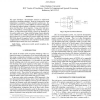Free Online Productivity Tools
i2Speak
i2Symbol
i2OCR
iTex2Img
iWeb2Print
iWeb2Shot
i2Type
iPdf2Split
iPdf2Merge
i2Bopomofo
i2Arabic
i2Style
i2Image
i2PDF
iLatex2Rtf
Sci2ools
112
Voted
ICASSP
2011
IEEE
2011
IEEE
Whole word discriminative point process models
This paper introduces a discriminative extension to whole-word point process modeling techniques. Meant to circumvent the strong independence assumptions of their generative predecessors, discriminative point process models (DPPM) are trained to distinguish the composite temporal patterns of phonetic events produced for a given word from those of its impostors. Using correct and incorrect word hypotheses extracted from large vocabulary recognizer lattices, we train whole-word DPPMs to provide an alternative set of acoustic model scores. Using solely the timing of sparse phonetic events, DPPM scores exhibit comparable discriminative power to those produced by a state-of-the-art acoustic model built using the IBM Attila Speech Recognition Toolkit. In addition, the inherent complementarity of frame-based and event-based models permits significant improvements from score combination.
Related Content
| Added | 20 Aug 2011 |
| Updated | 20 Aug 2011 |
| Type | Journal |
| Year | 2011 |
| Where | ICASSP |
| Authors | Aren Jansen |
Comments (0)

